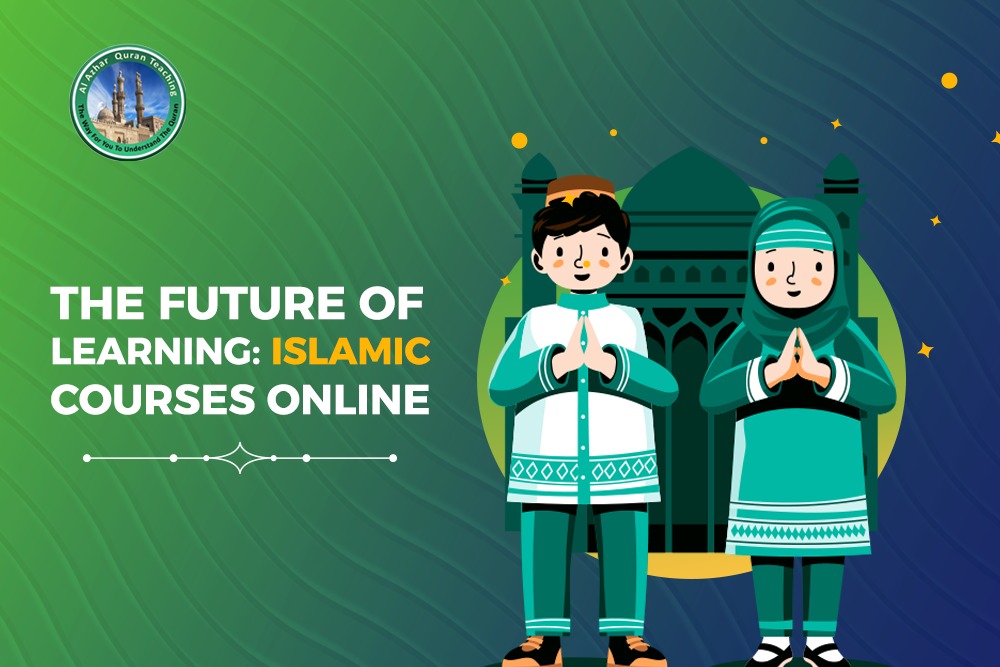The Future of Learning: Islamic Courses Online
The future of learning is rapidly evolving and online education is leading the way. This is especially evident in the realm of Islamic courses, where advancements in technology and increased accessibility are revolutionising the way students learn about Islam.
In this article, we will explore the bright future of online Islamic courses, the benefits they offer, and how they are reshaping traditional education. So, hop aboard this educational journey and discover the exciting opportunities that wait for those seeking to expand their knowledge of Islam in the comfort of their own home.
5 Types of Online Islamic Courses You Should Know About
- Quran Studies Courses
These courses focus on the study and understanding of the Quran, the holy book of Islam. They often cover topics such as recitation, Tajweed (pronunciation rules), Tafsir (interpretation), and memorization techniques. Quran studies courses are suitable for beginners as well as those looking to deepen their knowledge of the Quran.
- Arabic Language Courses
Arabic is the language of the Quran, and learning it can greatly enhance your understanding of Islamic teachings. Online Arabic language courses for non-native speakers are designed to teach the basics of grammar, vocabulary, and conversation skills. Some courses also incorporate religious terminology, enabling students to better comprehend Islamic texts.
- Hadith Studies Courses
Hadiths consist of the words, deeds, and endorsements of Prophet Muhammad (peace be upon him). Courses on Hadith studies explore the examination of these verified accounts, including determining their legitimacy, organizing them, and comprehending their meanings. Such courses offer students valuable knowledge about the life and teachings of the Prophet, enabling them to implement his teachings in their everyday lives.
- Islamic History Courses
Understanding the history of Islam is essential to comprehend its development and important events. Online Islamic history courses explore the rise of Islam, the lives of the Prophet Muhammad and his companions, caliphates, and the spread of Islam across different regions. These courses provide a comprehensive understanding of the rich and diverse historical context in which Islamic teachings evolved.
- Shariah Law Courses:
Shariah law is a vital aspect of Islamic jurisprudence. Online courses on Shariah law delve into the principles, sources, and applications of Islamic legal systems. Students learn about the different branches of Shariah law, its relevance in contemporary society, and its influence on family law, commercial transactions, and criminal justice. These courses are valuable for individuals seeking a deeper understanding of Islamic legal principles.
- Takeaways
- Quran Studies courses help in understanding and memorizing the Quran.
- Arabic Language courses facilitate better comprehension of Islamic texts.
- Hadith Studies courses provide insights into the teachings of the Prophet Muhammad.
- Islamic History courses give a comprehensive overview of historical events and figures in Islam.
- Shariah Law courses offer a detailed understanding of Islamic legal principles and their applications.
Importance Islamic Courses of Online in the Future
- Global Connectivity
The future of Islam Courses lies in online platforms, as they enable Muslims from all corners of the world to connect and engage in meaningful discussions. Online forums, social media, and video-sharing platforms facilitate the exchange of ideas, foster unity, and break down geographical barriers. It allows Muslims to form a global community, strengthening their bond and understanding of one another.
- Access to Knowledge
Islamic Courses online resources provide a wealth of knowledge at the fingertips of Muslims worldwide. Websites, blogs, and online courses offer a vast array of Islamic teachings, interpretations of the Quran, Hadiths, and scholarly works. This accessibility to religious literature helps individuals deepen their understanding of Islam, irrespective of their geographical location or language barriers.
- Promoting Interfaith Dialogue
In an increasingly interconnected world, online platforms play a pivotal role in promoting interfaith dialogue. Muslims can engage in meaningful conversations with people from different faiths, dispelling misconceptions and fostering mutual respect. Islamic websites and social media accounts act as bridges between Muslims and non-Muslims, fostering understanding and creating an environment of peaceful coexistence.
- Da’wah and Outreach
The internet provides a powerful tool for spreading the message of Islam and carrying out da’wah (Islamic propagation). Muslims can create informative and engaging content through articles, videos, podcasts, and social media posts to reach a wider audience. Online platforms also allow for targeted outreach and the ability to connect with individuals who may have limited exposure to Islam.
- Emotional and Mental Support
Islamic online communities offer an invaluable source of emotional and mental support for Muslims. Through forums, helplines, and dedicated online support groups, individuals can find solace, guidance, and advice during challenging times. These platforms provide a safe space for Muslims to share their experiences, seek advice from knowledgeable individuals, and find comfort in the words of the Quran and the teachings of the Prophet Muhammad (peace be upon him).
- Strengthening Islamic Identity
The digital age presents both opportunities and challenges for Muslims to maintain and strengthen their Islamic identity. Islamic online platforms play a crucial role in disseminating authentic Islamic teachings, countering extremist narratives, and reinforcing the values of peace, compassion, and tolerance within the Muslim community. It helps individuals stay connected to their faith and navigate through the complexities of modern life.
- Building Bridges of Unity
Online platforms enable Muslims from diverse backgrounds to come together and celebrate their shared values and beliefs. Virtual gatherings, webinars, and live streams allow Muslims to participate in events regardless of their physical location. This sense of unity strengthens the bond of brotherhood/sisterhood among Muslims globally and promotes a sense of belonging and togetherness within the Islamic community.
In conclusion, the Islamic world is increasingly recognizing the importance of online Courses in shaping the future of Islam. These digital spaces facilitate global connectivity, provide access to knowledge, promote dialogue, carry out da’wah, offer support, strengthen Islamic identity, and build bridges of unity. Muslims must utilize the power of the internet to cultivate a positive image of Islam, counter misinformation, and foster a more connected and cohesive global Muslim community.

